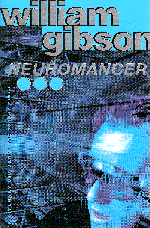|
Neuromancer
Copyright 1984 by
I first read this in 1986 and most recently on the 22nd June 2006 Case is a down-and-out ex console jockey. All he ever wanted to be was a console jockey, a master of cyberspace, but that's gone now and there is no hope of getting it back. He's only twenty-four but he feels his real life is over. He's reduced to dealing on the street, with increasingly less care for his safety. Then he's made an offer he can't refuse. Armitage, ex Special Forces, and Molly a hyped-up, heavily armed Razorgirl, want him for one special job. To enable him to do the job, they'll give him back his heart's desire and reinstate him as a console jockey. Working for the mysterious Wintermute, Case, Armitage and Molly will make their attack on Straylight, the orbital home of the Tessler-Ashpoll clan. They'll drag some other unusual characters along with them: Dixie Flatline, the Finn, Riviera, Kuang Grade Mark II and righteous Rastafarian warrior Maelcum. I can't review this book with any clarity of feeling. I can't separate my feelings for this from how I felt about the whole Cyberpunk genre. Gibson started Cyberpunk (well almost), he coined the word "Cyberspace". He was the brat that kicked the knees of established SF and toppled it over, leaving his new high tech, low life world towering like the Chiba city skyline*. Well of course it wasn't quite like that: Bethke had already coined the word cyberpunk; Gibson's "Johnny Mnemonic" and "Burning Chrome" were written two years earlier and Bruce Sterling was there to help make it coalesce, crystalise and hit the street running. But Neuromancer was the first "cyberpunk" novel plus it was the first "cyberpunk" I ever read. I was working at a leading-edge technology company serving up giant databases of information to online customers years before the public Internet surfaced. The closest we had to Gibson's Matrix was Compuserve and that only reached Japan in '86. Cyberpunk was exciting, and more importantly to me, relevant. Plus (sneakily slipping in a plug for John Brunner), I'd felt there was something unaddressed in SF since "The Shockwave Rider". It's surprising now to look back twenty-two years and see how simple and straightforward his writing was then. There's a quite difference in style between this book and "Count Zero" and even more so on the subsequent books. Which of his books do I like most? The answer probably depends on my mood, but I can say that the first three - this, "Count Zero" and "Mona Lisa Overdrive" are the best subgroup of his oeuvre - each one is more accomplished, more sophisticated than its predecessor yet they so clearly maintain the same Weltanschauung. Thanks by the way to Cyberpunk and in particular the timeline. in which I'm astonished to see a list of my favourite books. * The future Chiba City skyline. The current one doesn't so much tower as lounge. Loaded on the 15th July 2006.
|
|





